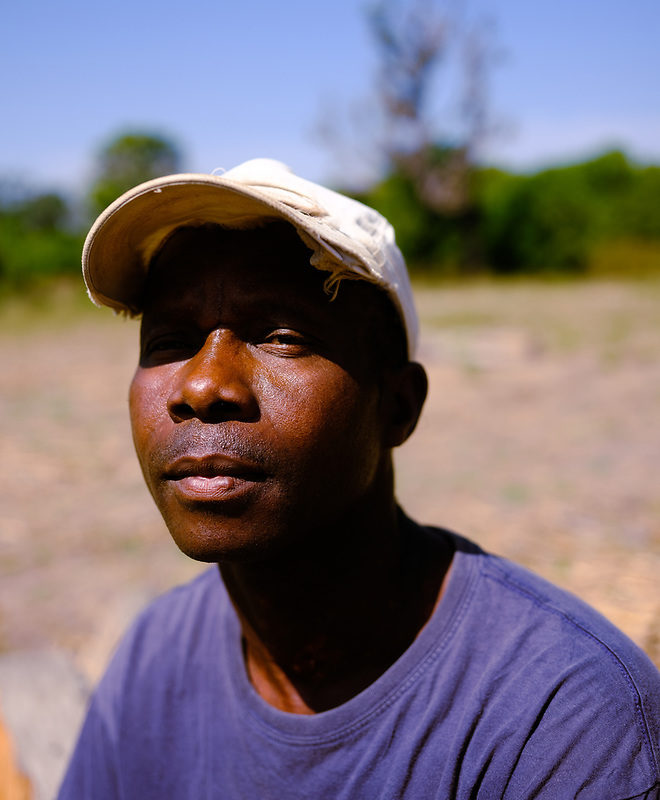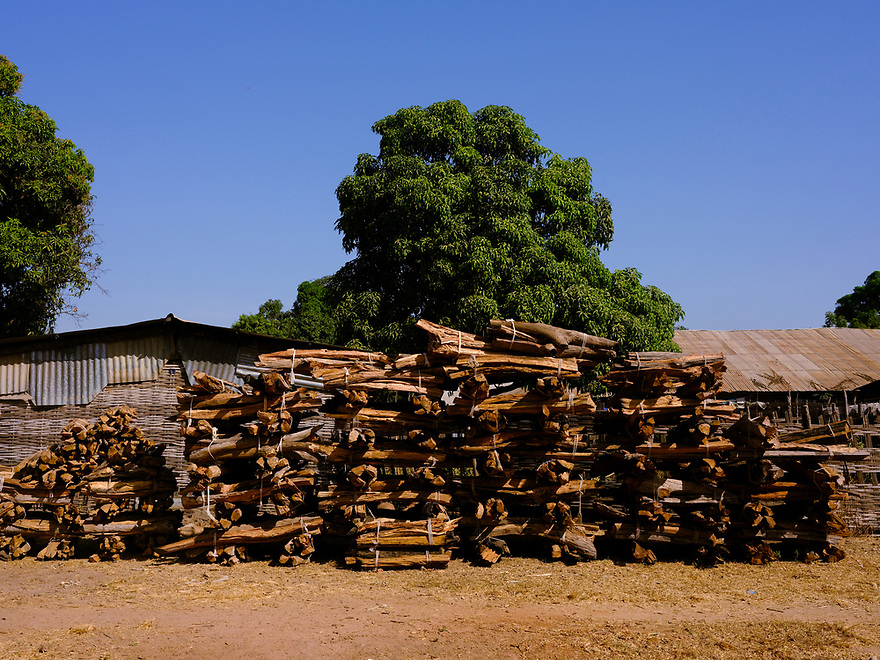The Guinea-Bissau government is poised to lift a moratorium on logging that came into force in 2015.Forestry officials and conservationists say they fear a return to rampant overharvesting of rosewood and other valuable species.Those defending an end to the ban say illegal logging has continued anyway and the decree ending the moratorium will put better monitoring in place and allow locals to benefit.Conservationists say that without better data about the current state of the country’s forests, it will be impossible to monitor or sustainably manage a resumption of logging.
Three men are piling wood on a solitary truck parked along the only the road to Djendo, a small town in eastern Guinea-Bissau. They work in silence, throwing rosewood, a high-quality timber especially prized in China, into the vehicle’s bed. A moratorium on cutting timber was put in place in the West African country in 2015, but the manager of this operation says these logs are dead wood, and thus legal to sell.
A few months from now, he might not have to worry about explaining himself: high-level government officials in Guinea-Bissau are pushing to lift the logging ban. The council of ministers has drafted a decree lifting the moratorium that awaits only the president’s signature.
Loading rosewood into a truck. Image by Ricci Shryock for Mongabay.
Forestry agent Malam Djassi was posted to Djendo in 2019 — the first government official anyone here can remember assigned specifically to monitor logging. Recalling the period between 2012 and 2014, when illegal logging threatened to wipe out the country’s stock of rosewood trees entirely, he says he hopes the moratorium will not be lifted.
“High numbers of large trees that existed at that time were almost wiped out,” he says. According to a 2018 report by the Environmental Investigation Agency (EIA), timber exports from Guinea-Bissau to China went from 61 tons in 2007 to close to 98,000 tons in 2014.
“We think the state should extend the moratorium more so that the smallest trees grow and then open” to timber sales again, Djassi says.
Constantino Correia, an agro-engineer and former director of Guinea-Bissau’s forest management agency, tells Mongabay it takes 45 to 50 years for a rosewood tree to grow to maturity.
Environmental activists and some law enforcement officers say they fear that if the ban is lifted, the country will see a repeat of the overharvesting of trees that led to the ban.
Abilio Rachid Said, a forestry expert and head of programs at the country’s Institute of Biodiversity and Protected Areas, says logging should resume only after a census of the country’s forestry stocks has been completed and there are adequate mechanisms in place to oversee restrictions that are outlined with the decree.
“We don’t know how much wood we have, what is the capacity, the conditions of the forest, and what is the level of exploration that is sustainable? There are a lot of things we have to do before this decree is put into action,” Said says.
Culpability for illegal logging runs all the way to the highest ranks of Guinea-Bissau’s government. Late last year, law enforcement officials intercepted at least two trucks carrying illegally logged wood not far from Djendo. After an initial investigation, a small number of Chinese nationals were arrested, and a business owned by the current prime minister, Nuno Gomes Nabiam, is suspected of being involved. The Judicial Police submitted the results of their investigation, which also implicates the minister of the interior and the head of the police force, to the Attorney General’s Office. No charges have been filed yet.
Standing against this threat are officials like Djassi, who does his work in plain clothes: a ripped baseball cap, navy blue slacks and a T-shirt. His phone is an ancient Nokia, which is great for durability, but not so great if he wants to take pictures documenting abuses, or communicate via WhatsApp. Djassi says he has come across loggers cutting wood illegally and had no choice but to walk away without confronting them.
 Forestry agent Malam Djassi was posted to Djendo in to monitor illegal logging. Image by Ricci Shryock for Mongabay.
Forestry agent Malam Djassi was posted to Djendo in to monitor illegal logging. Image by Ricci Shryock for Mongabay.
“We usually control the bush on foot, looking out for an 8-kilometer [5-mile] area. We still need more government support when it comes to training in the environmental field,” he says.
There is support for resuming logging in Djendo. Talibo Coté, the village head, says he wants the moratorium to be lifted, partially for the same reason Djassi wants it to remain in place: logging has continued despite the ban. Coté says that if the ban is lifted, they can better regulate the cutting, jobs will be created, and the community can benefit economically from responsible logging.
He echoes points made by the country’s minister of the environment, Viriato Cassama, who says the moratorium was mostly cosmetic. “From a political point of view [the ban] had an impact but from a practical point of view it did not have an impact. It is like drugs. It is prohibited but it continues to be used,” he says. Cassama says that by lifting the ban while enacting strict regulations, such as requirements to replant after cutting, authorities can improve their management of the forests.
One notorious example of continued cutting during the moratorium took place in 2018, when the country sold off a stockpile of logs that had been sitting idle since the ban three years earlier. According to the EIA, traffickers used the opportunity to mix newly cut wood in with the leftover stocks and export them together. The sale was approved by the CITES Secretariat, and according to the EIA, government officials were in need of money due to pressure by the IMF to reimburse a defaulted loan. The World Bank encouraged the sale.
“It’s impossible to count what has been stolen,” says Correira when asked for an estimate on the amount of wood cut during the moratorium, but he adds it was far less than what was logged from 2012-214.
In the town of Djendo, one spot remains untouched: a sacred forest at the entrance of the community. In certain areas of Guinea-Bissau, communities hold essential coming-of-age ceremonies and sometimes resolve intercommunity legal procedures, such as land disputes, within sacred forests and spaces. These spaces are considered absolute no-go zones for timber and cutting, and the spiritual and legal importance of these areas has meant most of them have remained untouched. Although Djendo is in the country’s east, where the traditional practices and ceremonies that require a sacred forest have largely diminished due to the influence of Islam, residents still ensure their sacred forest remains untouched.
Coté, the Djendo village leader, says the spot was used as a site of shelter and protection during the country’s 11-year independence fight against Portugal from 1963 to 1974. Although he adds the forest no longer plays a religious role, building is still forbidden in the space, and much of the community believes there are spirits among the trees that should not be disturbed.
One afternoon in December, Coté walks under the lush tree canopy, his bright blue robe contrasting against the greenery and shadow of the trees. Inside, the forest is quiet, but off in the distance the sound of an ax hitting wood can be heard. He looks up knowingly: trees are being felled, but outside the confines of this sacred space.
Reporting for this story was supported by funding from The Pulitzer Center Rainforest Journalism Fund
 Rosewood – ostensibly deadfall – for sale near Djendo. Image by Ricci Shryock for Mongabay.
Rosewood – ostensibly deadfall – for sale near Djendo. Image by Ricci Shryock for Mongabay.
Further reading
CITES appeals to countries to watch out for trafficked Malagasy rosewood
Singapore convicts rosewood trader in historic CITES seizure
West African countries come together to stop the illegal rosewood trade
Banner image: Village head Talibo Coté in the forest near his hometown, Djendo. Image by Ricci Shryock for Mongabay.
FEEDBACK: Use this form to send a message to the author of this post. If you want to post a public comment, you can do that at the bottom of the page
Biodiversity, Conservation, Deforestation, Endangered Species, Environment, Environmental Politics, Illegal Timber Trade, Protected Areas, Rainforests, Rosewood, Timber
Africa, Guinea-Bissau, West Africa
Source link : https://news.mongabay.com/2021/01/fears-for-rosewood-as-guinea-bissau-prepares-to-lift-six-year-logging-ban/
Author :
Publish date : 2021-01-21 08:00:00
Copyright for syndicated content belongs to the linked Source.




